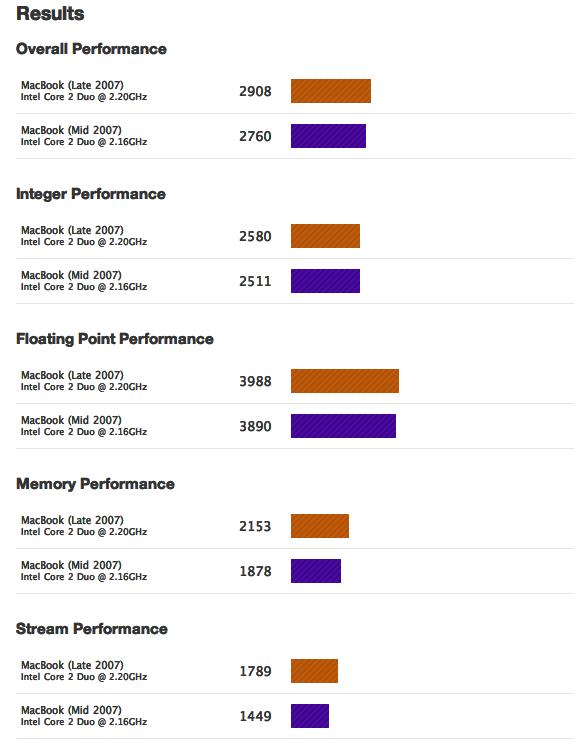Apple has followed up last week's release of iMac Software Update 1.2 with a new version that addresses Leopard installation issues. Meanwhile, the company has also posted a fix for users who've faced problems backing up more than 10GB of data via Time Machine. And some new Santa Rosa MacBook benchmarks are available.
On the heels of iMac Software Update 1.2, Apple on Tuesday released iMac Software Update 1.2.1 [13.3MB] for users of its 20-inch and 24-inch aluminum iMacs who are running Mac OS X Tiger.
Apple says the latest update "improves the performance and reliability of graphics-intensive games and applications and fixes an issue that some customers encountered when installing Mac OS X Leopard after applying iMac Software Update 1.2."
The update does not appear to target freezing issues experienced by aluminum iMac owners. iMac Software Update 1.2 released last week was expected address those problems, though several users have reported that their iMacs continue to randomly lock up even after having applied the patch.
Time Machine stops backing up
Leopard users have also been experiencing an issue where after about 10 GB or more of data is backed up to an external disk, Time Machine may stop the backup process. The glitch commonly occurs the first time Time Machine backs up a system, as subsequent backups are much smaller.
In a tech support note this week, Apple explained that some external hard disks ship with a Master Boot Record partition type that is incompatible with Time Machine.
"You will need to erase the external disk so that it is supported by Time Machine," the company says. "Once the external hard disk is reformatted, select it again in Time Machine preferences and use it for your backups."
Santa Rosa MacBook benchmarks
Apple quietly released new MacBooks last week which feature (among other things) the Santa Rosa chipset and, for some models, a slightly faster processor. The folks at PrimateLabs have run their usual round of benchmark tests and found that while new models have only modest processor performance gains over the previous MacBooks, the Santa Rosa chipset helps them achieve some impressive memory performance gains.
Memory performance is said to be up almost 15 percent, while stream performance (which relies heavily on memory) is up almost 25 percent.
The new MacBooks also support 4GB of RAM (where the previous MacBooks only "officially" supported 2GB of RAM), making them ideal for anyone who runs memory-intensive applications but doesn’t want to pay the premium for a MacBook Pro.
 AppleInsider Staff
AppleInsider Staff







-m.jpg)






 Andrew Orr
Andrew Orr
 Malcolm Owen
Malcolm Owen
 William Gallagher
William Gallagher

 Wesley Hilliard
Wesley Hilliard







-m.jpg)




19 Comments
For example: Windows XP under either Fusion or Parallels.
If I were one of those Mac users STILL having lockups after all this time, I would check out my states lemon law and get Apple to give me a new machine. There is no excuse for this to have gone on a year.
The new MacBooks also support 4GB of RAM (where the previous MacBooks only "officially"supported 2GB of RAM), making them ideal for anyone who runs memory-intensive applications but doesn’t want to pay the premium for a MacBook Pro.
[ View this article at AppleInsider.com ]
I see that you put emphasis on Officially, does this mean prior Core Duo based Macs actually accept 4GB of RAM? This is huge for me - please reply.
Also what's up with the lack of video benchmarks.
I've already been through this with my old Core Duo Mac. The original Core Duo's were only 32-bit processors and absolutely max out at 2GB of RAM because of their architecture. If you put 4GB of ram in them, the OS will only see 2GB.
The only iMac before the aluminum ones that supports more is the 24" iMac and that max's out at 3gb.
I see that you put emphasis on Officially, does this mean prior Core Duo based Macs actually accept 4GB of RAM? This is huge for me - please reply.
Also what's up with the lack of video benchmarks.
I see that you put emphasis on Officially, does this mean prior Core Duo based Macs actually accept 4GB of RAM? This is huge for me - please reply.
Also what's up with the lack of video benchmarks.
For pre-late-2007 MacBooks and Mac Minis with core 2 duo:
They support up to 3 GB. You can put 2Gb+1Gb or you can put 2x2Gb for faster dual channel operation but the OS will only detect and use 3 Gb. Note that this does not apply to non-GMA950 machines. Check www.macsales.com for accurate informations regarding these.
edited for mac mini/macbook
edited for core2duo
cheers,
Beepboy